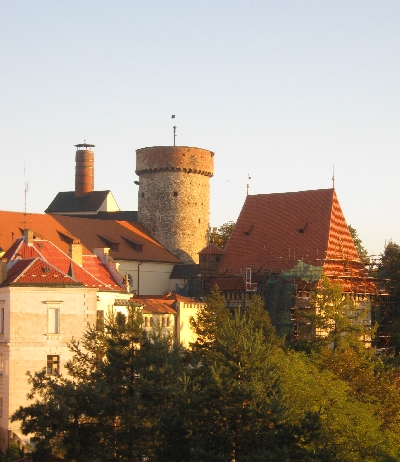
I’ve become very aware that in recent months, my blog has been predominantly a travelogue with a bit of history thrown in, together with articles describing the changes taking place in and around the Podbaba area of Prague 6 where I currently live. The more spiritual or reflective posts have been somewhat absent. I hope that with this post, the balance will begin to be corrected.
Last week, the news was dominated by the death of Steve Jobs, the co-founder, Chairman and CEO of Apple Inc, whilst the sports pages reported the death of Graham Dilley, the former England test cricket fast bowler. What most struck me about the death of both these individuals was their age – Jobs was 56 and Dilley only 52 – therefore both were younger than I am now.
Around the same time as the deaths of these two well-known individuals, I passed a significant milestone in my own life – I am now at least ten days older than my father was when he died nearly forty-one years ago from an acute myocardial infarction or a heart attack as it is commonly known. I was just eighteen years old at the time of his death.
In some ways, I feel a certain sense of satisfaction that I have now passed this landmark. And whilst I cannot change my family history, my father being only fifty-nine when he died and my mother dying ten years later aged sixty-three, I do find it somewhat reassuring that both my sisters are now older than our mother was at the time of her death. But having said that, I have also become very aware of my own mortality. Who but God knows when my time to die will come?
In reporting the life and recent death of Steve Jobs, numerous journalists have made reference to a speech he gave to graduating students at Stanford University, California, a few years ago, soon after he was diagnosed with pancreatic cancer. In it, he spoke quite openly about the one fact of life that most of us rarely dare to mention – the fact that sooner or later, each one of us will die. He reminded his audience of what he himself had read when he was 17 which went something like, “If you live each day as if it was your last, someday you’ll most certainly be right.”
In one other memorable quotation from that address he declared, “No one wants to die. Even people who want to go to heaven don’t want to die to get there. And yet death is the destination we all share. No one has ever escaped it” In the light of this important truth, he encouraged his hearers to make sure that each day in the future, they were doing something worthwhile and something that they wanted to be doing, recognising that their lives are finite.
On Sunday 18th September, the last Sunday I officiated at St. Clement’s before attending the Eastern Archdeaconry Synod and then taking two weeks annual leave, we celebrated Harvest Festival, giving thanks to God that ’All good gifts around us are sent from heaven above’. For the service, I used the Biblical readings set for Harvest Festival in Year A of the three year lectionary cycle. This meant that the Gospel Reading was Luke 12. 16-30 which begins with Jesus telling the parable of the rich fool – the story of the farmer who pulled down his barns and built bigger ones in order to store the abundant harvest from his lands.
Whilst the parable does have a harvest theme in its story line, that isn’t the reason Jesus told it in the first place. In fact the compilers of the lectionary have unfortunately omitted the three previous verses, which clearly put the account in context. In Luke 12. 13-15, the Gospel writer tells us that a person in the crowd asked Jesus to instruct his brother to more fairly divide the family inheritance of their late father. In response, Jesus both declines to do so and reminds his hearers that, “life does not consist of an abundance of possessions” – a verse I’ve referred to previously in this blog.
In telling the parable of the so-called ‘rich fool’, Jesus does not condemn him for pulling down his barns and building bigger ones. No – it was a perfectly sensible thing to do. It is his attitude that he can, ‘Take life easy, eat, drink and be merry’, that causes God to call him a fool. It is his failure to recognise in the words of Steve Jobs that, “Death is the destination we all share. No one has ever escaped it”.
The challenge to me and to us all, is to live our lives in recognition that, in the words of a well-known Negro spiritual, ‘This world is not my home, I’m just a passing through’. We do not know when our lives will end and, when they do end, to recognise that we will not be able to take our possessions with us. Whilst I hope to be able to retire in just over five year’s time, I cannot guarantee that I will still be here to do so. Who knows when God will say, “This very night your life will be demanded from you.”?
